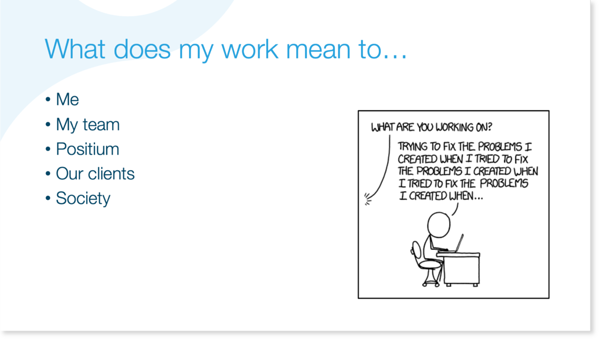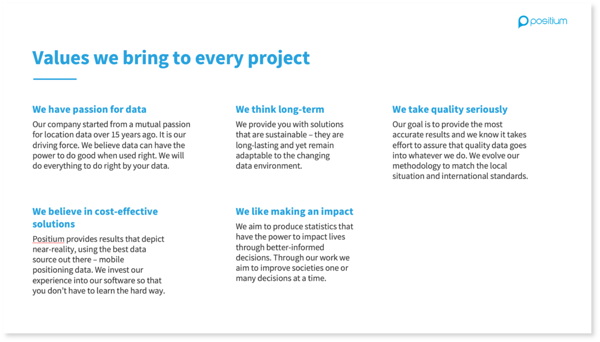How to make introverts comfortable?
Group discussions can evoke different emotions in people. Some love them, others find them uncomfortable. It is important not to forget introverts and people who truly shine when they have time to process things alone at their own pace – we knew we had to give them time. What is more, most of our employees are Estonians, who are not always the most talkative of people.
It was important for us that everyone felt as comfortable as possible while sharing those personal thoughts with others. This is why we built the process from the ground: first individual work, then discussions in small groups, with each group presenting their ideas to everyone else at the end of the workshop. We also made sure to keep the discussion relaxed and informal, because our biggest fear was that people would feel like they had to think in a certain way. This is also the reason why we avoided words such as mission, vision or values in the communication.
Step 1: individual contemplation
Firstly, we gathered everyone together and made a small intro about what the workshop was about. We gave people one simple question – what does my work mean? – and asked them to answer in five categories – to me, my team, Positium, our clients, and the society. After the intro, everyone found a comfortable place and pondered this question for around 15 minutes.Step 2: discussions in small groups
After individual contemplation, people were divided into small groups of 3–4 people, making sure to keep them small so that everyone got a chance to speak. We formed groups randomly, just based on people’s location in the room. This resulted in quite diverse groups with people who maybe usually don’t have so much contact.
Sharing your thoughts in a small group before the “big reveal” offered the feeling of security and validation.
Although we would’ve ideally liked everyone to be present physically, remote work is an essential part of today's labour market and some of us either live abroad or just couldn’t make it to the office. As there were only a few of such people, they could form their own group. Sharing your thoughts in a small group before the “big reveal” offered the feeling of security and validation – someone has already listened to me and found my thoughts relevant. Discussions in small groups took around 15–20 minutes.
Step 3: sharing with everyone
After people were done with sharing their thoughts in small groups, we gathered around to share the insights with everybody. Although we didn’t prescribe it, most groups chose to have one person who presented their ideas. We started discussing the answers from the most personal level and moved towards the more general ones. It was very nice to see people thinking along, reflecting and offering their opinions on things that were said.
On the personal level, there was greater variety in the answers, as was expected, but many common themes still emerged. It is clear that our employees see work as a place for development and a source of fulfillment. Many mentioned the possibility to learn new things, especially from people who are more experienced. Financial stability was mentioned as an important aspect as well.
Being a valuable team member was an important point to many – in terms of knowledge and abilities, but also as a friend and supporter. There are many people who see their job through the prism of service – they help and enable others to do their job better. This applies both to creating a supportive environment, but also to bringing in interesting work and clearing any roadblocks that might arise. It was interesting to see that people didn’t really differentiate between their roles and impact in their small teams and in the whole company.
We take great pride in our deep and meaningful relationships with our clients. This was clear from the answers people provided, even by those who don’t have direct contact with them and mainly work behind the scenes. People see themselves as trustworthy helpers, problem-solvers, providers of information and clarity in the complicated world of MPD, as well as delivering quality results on time. We believe in having a long-term vision.
By the time we reached the whole society level, the answers were more or less the same – helping the society by providing good-quality data which enables better decisions and is cost-effective. It seems that we in Positium truly want to make the world a better place.
Step 4: conclusions and summaries
All in all, this 1.5-hour workshop about the meaning of our work was truly wholesome. Some of us said that they had never thought about those aspects of their work. But there were even more people who were happy to find that their colleagues shared their thoughts and values.
Finding our values in a company-wide workshop was a highly fulfilling, exciting and great experience.
We learned that we mostly have a very common understanding of why we are here and why our work matters. However, this doesn’t mean that nothing new emerged from the discussions. The discussions helped gain a new perspective on what people themselves value about their work and the company. Another aspect that we noticed was that people can have very different levels of confidence about their work and value. We now make sure to pay even more attention to giving praise and positive feedback to make sure that everyone feels appreciated.
Step 5: formulating values
After the workshop, we gathered all answers into short bullet lists, which were interesting to read, but still too long to act as a short summary. While looking at the results, it was clear that there were some common topics that were mentioned time and again, so we summarised them as a small paragraph. While doing that, we realised that those really are the things we care about the most, that are essential to what we do. And so our value statement was born and we started thinking about our new mission and vision – based on the summary of a 1.5-hour workshop. Nothing cliché or pretentious, just us and the things we believe in that drive our everyday work.
Our values
We have a passion for data. Our company started from a mutual passion for location data over 15 years ago. It is our driving force.
We think long-term. At Positium, we aim to provide our clients with solutions that are sustainable – they have longevity, but remain adaptable to the changing data environment.
We take quality seriously. Our goal is to provide the most accurate results from quality-assured mobile positioning data. Our methodology is evolving constantly and is verified by international statistical organisations (e.g. UN GWG).
We believe in cost-effective solutions. Positium provides results that depict near-reality, using the best data source out there – MPD.
We like making an impact. Positium produces impactful statistics that are effective and easy to use for decision-makers around the world. The ultimate goal is to improve societies and the quality of life through better-informed decisions.
Aftermath
Another interesting thing that happened is that people started to “translate” those values into specific fields that they are dealing with. For example, how those values are expressed in client projects, marketing or cartography.
Finding our values in a company-wide workshop was a highly fulfilling, exciting and great experience. If formulating values had happened top-down, we probably wouldn’t have ended up where we did and people wouldn’t have cared or related so much to the outcome. But now we can say with full certainty that those values truly represent Positium and its people.
The positive effect of this workshop didn’t stop there – it was continued by lengthy discussions about formulating our mission and vision. Of course, special care was taken with them as well, in order to make them meaningful and true to us, not just some random sentences full of business-jargon.
You can read more about the next steps we took in order to define our mission and vision in Part 2 of the series.
.png)


